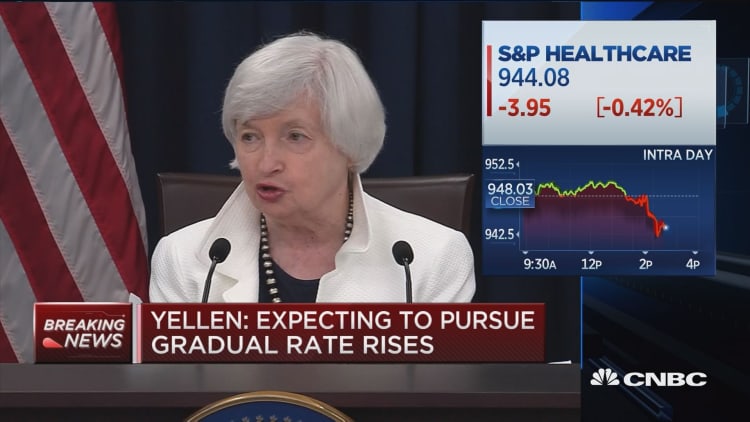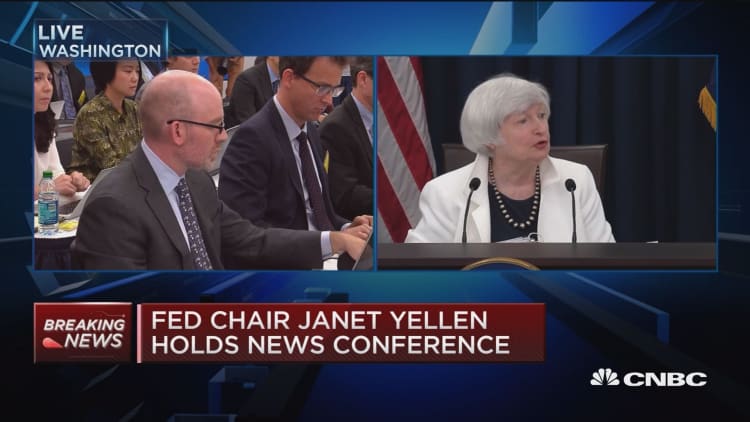
The Fed sent a strong message that it plans to keep raising interest rates, even as it unfurled plans to shrink its mammoth-sized balance sheet.
The Fed's actions Wednesday also make clear that regardless of who is running the Fed next year, it is committed to its plan to shrink its portfolio and back away from the last phase of the extraordinary easing it began in the financial crisis.
Treasury yields moved higher across the curve, with the yield shooting to 1.45 percent, an eight-year high. That portion of the curve is most reflective of Fed rate hiking. The 10-year yield, which influences mortgages and other consumer and business rates, rose to 2.28 percent, from 2.23 percent.
Fed funds futures also jumped, now showing odds of a rate hike this year at 64 percent from 50 percent. Economists expect a quarter-point rate hike at the Fed's December meeting. Fed Chair Janet Yellen's term ends early next year unless she is reappointed by President Donald Trump.
The dollar index reversed losses and was sharply higher in late trading. Stocks initially weakened across the board on the outlook for higher interest rates, but the Dow and reversed losses to close higher on the day. Bank stocks rallied.
"It seems like the Fed is a go," said Michael Schumacher, director, rate strategy at Wells Fargo. The Fed maintained its forecast for one rate hike this year and three next year, but lowered 2019 to just two from three, he said.

The Fed also said it would reduce its balance sheet, by slowing down its bond purchases by $10 billion a month initially, as expected. The Fed has been making those purchases to maintain its balance sheet size, replacing Treasury and mortgage securities as they mature. By reducing those purchases by ultimately $50 billion a month, the Fed will gradually shrink the $4.5 trillion balance sheet.
"I think the Fed pretty much did what was expected. You got the balance sheet cuts. They're starting in October. They weren't delayed. That's a little bit hawkish," said Schumacher.
There was some speculation in the market that the Fed could have taken the balance sheet reduction more slowly, waiting until after it sees what damage hurricanes Irma, Harvey and now Maria have done to the economy.
But the Fed said it sees that damage to the economy as temporary. It also said the higher gasoline prices and rising costs for some other items in the aftermath of the hurricanes will "likely boost inflation temporarily."
"It's bad for the people and bad for the short term, but the Fed has seen a lot of natural disaster and it knows the pattern," Schumacher said.
The Fed expects inflation on a 12-month basis to remain "somewhat below" its 2 percent target in the near term but to stabilize around 2 percent over the medium term.
"Near-term risks to the economic outlook appear roughly balanced, but the Committee is monitoring inflation developments closely," the Fed said.
Art Hogan, chief market strategist at Wunderlich Securities, said one of the more important revelations came from Yellen when she said at her press briefing that it would take a material development to stop the Fed from continuing its automatic process of reducing the balance sheet.
"That's the tool and letting the matured assets run off is going to be an automatic process until they get to the new normal," Hogan said. Yellen said it would take "material deterioration" in the economy or some extraordinary change in financial conditions to curtail it.
"By making that automatic that will keep any new chair coming on from changing it," he said.
Yellen also reaffirmed that the fed funds rate is its first tool. She said the Fed is embarking on the balance sheet reduction because of the substantial progress it sees in the economy.
"The balance sheet is really seen as something they want to operate in the background," said Mark Cabana, head of U.S. short rate strategy at Bank of America Merrill Lynch. Cabana said it was unusual for the Fed chair to be so explicit about what it would take to stop the balance sheet reduction. "She used the high hurdle, high bar language a couple of times."
The Fed had also been unusually detailed and methodical in how it has announced its plans for its balance sheet.
"The plan they put out in June was pretty clear. It sounded almost mechanical. The Fed always says it is data dependent but in June it sounded data independent," said Schumacher of the balance sheet move.
Hogan also said the Fed remains ahead of market expectations in its rate forecast. "They have been through the hiking cycle, but I don't think that's bad," he said.
The Fed also cut its forecast for its longer run rate to 2.75 percent from 3 percent. Strategists said the reduction was not that important and it is unclear when the longer run would be.
"There's no information value. It's normally limited but we could have a complete wholesale changeover in the Fed six months from now," said John Briggs, head of strategy at NatWest Markets.
WATCH: Yellen says Fed is not locked into policy plans



